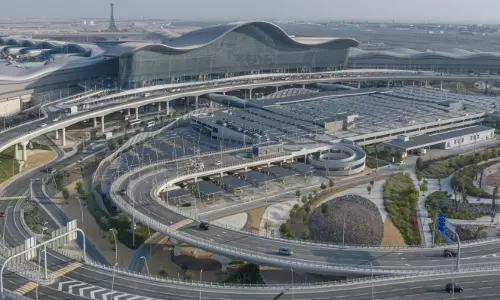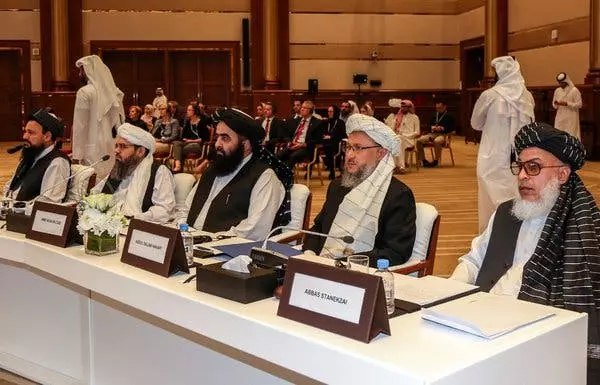
Is Taliban back to the reign?
text_fieldsFile photo of Afghan peace talks in Doha
On April 14, 2021, and before he completed the first hundred days of his term, US President Joe Biden decided his administration's position on the withdrawal of the American soldiers from Afghanistan. He accepted the agreement that the administration of his predecessor Donald Trump concluded with theTaliban movement on February 29, 2020, at Doha, Qatar and decided to start withdrawing his country's forces from Afghanistan - about 2,500 soldiers and NATO force approximately 7,000 members, in early May. This process of their withdrawal is to be completed before September 11, 2021, the day that marks the twentieth anniversary of the terrorist attacks carried out by Al-Qaeda in Washington and New York. For America, the cost of the invasion of Afghanistan was very high, in both human and financial terms. More than 2,300 American soldiers were killed and more than 20,000 soldiers were wounded in the war that has been going on. Also, more than 450 British soldiers and hundreds of other nationalities were killed. This made the US citizens ask why their soldiers should die in the wilderness of Hindukush hills. It was while the spiralling war was going on that BBC reported in 2018 that more than 70 percent of Afghanistan was till then under Taliban's control. That is how the Trump administration was persuaded to think about the withdrawal from Afghanistan. Thus the first peace agreement between the United States and the Taliban movement was signed on February 29th, 2020 in Doha, the capital of Qatar.
After taking the helm, President Joe Biden reviewed the agreement and decided to complete the withdrawal by September 11,2012. Accordingly, the White House confirmed that Defence Secretary Lloyd Austin approved the Central Command's request to temporarily deploy additional assets in order to ensure a safe exit for the US forces from Afghanistan. The Pentagon has deployed "B-52H" strategic bombers in "the area of responsibility of the Central Command of the Armed Forces to protect American and coalition forces during the withdrawal."
The "Taliban" movement has its own motives. It held a meeting in the Qatari capital, Doha . The members of the movement's political bureau and the envoys of Russia, the United States, China and Pakistan took part in the meeting. The spokesman for the movement's political office, Muhammad Naim said in a tweet that the meeting discussed removing the names of Taliban leaders from the blacklist of America and the need to release Taliban detainees in Afghan government prisons. He explained that during the meeting, they discussed the current situation in Afghanistan and the ongoing peace process. This meeting was one day after NATO began withdrawing its forces from Afghanistan, and the White House confirmed the start of the process of withdrawing the American forces. Biden's administration wants to ensure that the Afghan armed group fulfils its obligations, which include reducing violence and severing ties with those it described as terrorists.
Jake Sullivan, Biden's national security adviser, spoke with Afghan officials to confirm the intention of the administration. Afghanistan has witnessed in recent months a wave of assassinations. Indications suggest that no one, be it the Taliban or the Afghan people, wants the survival of the US forces, but the biggest challenge is concern about the emergence of a power struggle that will be translated in the form of military confrontations between the Taliban and the government forces under Ashraf Ghani and other factions in Afghanistan.
The government forces will find themselves in a big vacuum when the international forces leave. Their exit will not leave space to the Afghan parliament simply to take over the vacancies. The danger is that this withdrawal will generate the crisis again, especially since it cannot be said that there are political or ideological guarantees that the Taliban has become ready to participate in an Afghan political project with various parties. The future of Afghanistan today is not only linked to the withdrawal of international forces from Afghanistan , but also linked to the Taliban and the Afghan government and their ability to save Afghanistan from internal conflicts and sudden external interference in Afghan affairs. Mr. Matt Waldman, Fellow at the Chatham House Institute has published a study entitled: "An Opportunity in a Crisis ... Overcoming the Ambiguous Future of Afghanistan" .The study deals with presenting the main ideas and recommendations that cover three main areas: politics ,elections, and human development. In each of these areas there are many opportunities and complex challenges.The study scrutinized the efficacy and viability of the Afghan government. It indicates that the democratic institutions are weak, and power is controlled by a political elite formed on the basis of favoritism, bargaining and violence.
The electoral process is always undermined through fraud, adding that in the months leading up to the presidential and local elections held in April 2014, there were fears of a low turnout in the elections. Voter turnout in Afghanistan has been on the wane, significantly since 2004. Widespread corruption was alleged during the elections. This confirms Afghans 'perception that the elections are being manipulated by the political elite. Despite this, voter turnout was in large numbers in the 2014 elections. The reason for the high turnout was not Afghans' belief in democracy, but as a result of their desire for a new government. They saw voting as the best way to ensure a peaceful transfer of power, and as it paved the way for a secure future instead of violence. Looking ahead, the international community must provide permanent support for the holding of elections, and to ensure a strong and deliberate international role to ensure that disputes are resolved while respecting Afghan sovereignty at the same time. Afghan and international policymakers should take measures to curb electoral fraud, support youth participation in political life, and move forward with political and institutional reform.
The regional and international policymakers should prioritize dialogue aimed at achieving peace, and overcoming the mistrust between the Afghan government and the "Taliban" movement, as part of a broader and more comprehensive process of national consultation. This should be done in cooperation between the United States and China, relying on converging interests, and with the aim of securing regional support, especially from Pakistan, with the need for these parties leading the peace process to have the ability to manage expectations and the importance of adopting a long-term approach, given the inevitable difficulties.
Although the "Taliban" movement is only one faction of the armed opposition, divided into several competing factions, it is the largest, most organized and violent opposition movement, and therefore the most important among the armed movements in Afghanistan. Although its objectives are difficult to discern, it has declared its desire to establish an "Islamic regime". The "Taliban" movement expects a military victory and focuses on preserving the armed struggle. However, it has become less hostile to the idea of negotiations than it was a few years ago, and it has come to take political moves into account, along with the military effort. The agenda of the Taliban movement includes the strict application of Sharia.
When the American forces leave, the military and political vacuum will be significant, and it is certain that there will be those who will be competing again for Afghan soil. The important question is how the Afghan government would be able to deal with the "Taliban" movement. Is the "Taliban" still thinking the same way it did when it was an ally of "bin Laden" and "Al-Qaeda"? It does not seem that all parties of the American administration see this withdrawal as a positive step. The US intelligence agency is afraid of this withdrawal, which is clearly taking place without any form of guarantees regarding political security in Afghanistan. Experts predict a devastating civil war if the warring parties fail to reach a political agreement before the full withdrawal of international forces. The current Afghan government, which was built over the past two decades with American and European support, does not seem fully qualified to stand militarily against the Taliban. Despite Washington spending $86 billion to build an effective and sustainable Afghan security force, Kabul remains completely dependent on the United States for everything from funding to air support to fend off Taliban attacks.
The Taliban is preparing itself to enter Kabul as a victorious force, whose main objective is to return Afghanistan to the stage before the American invasion, that is, to establish an "Islamic emirate" without partnership with any other party, least of all the existing Afghan government.























